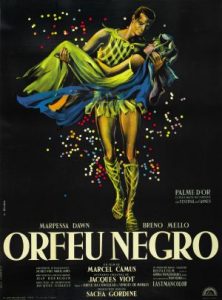Wednesday Double Feature – Orpheus
I was trying to find modern versions of Greek Mythology and somewhere in the middle of that rather general search I settled on the myth of Orpheus. The story of the master musician who looses the his true love only to loose her again while using his powers to go down to the underworld to regain her has been great material for artists for millenia and I watched two of them.
 For my first film we had Orpheus by the great Jean Cocteau, part of his Orphic Trilogy between Blood of a Poet and Testament of Orpheus. In this version Orpheus, played by Jean Marais, is an arrogant poet slightly past his prime as his popularity has been supplanted by younger artists who hate and criticize his work.
For my first film we had Orpheus by the great Jean Cocteau, part of his Orphic Trilogy between Blood of a Poet and Testament of Orpheus. In this version Orpheus, played by Jean Marais, is an arrogant poet slightly past his prime as his popularity has been supplanted by younger artists who hate and criticize his work.
During a scuffle at a poet’s club he is taken to the mansion of “a Princess”, played by María Casares, who is soon revealed to be “his death”. This causes him to be missing over the night drawing the attention of his wife Eurydice, the police, and a feminist literary magazine, le Bachanalle, who have past relationships with Eurydice and are very antagonistic against Orpheus.
Orpheus is brought home by the Princess’s chauffeur Heurtebise, played by François Périer, who stays on and befriends Eurydice. In the meantime Orpheus becomes obsessed with strange random messages coming from the car radio of the princes’s Limo. Eventually his inattention leads to Eurydice’s death in an accident and she is taken to the underworld by the Princess.
With Heurtebise’s help Orpheus follows them to the underworld where Eurydice’s is being investigated by a tribunal. Eurydice is given probation to return under the usual conditions of Orpheus being forbidden to look upon her (though unlike in the original story this condition is forever) the leads to a series of almost comical attempts of the two down everything to avoid being in each other’s line of sight. Regrettably he finally sees her in a car mirror and she disappears.
This is a wonderfully surreal film worthy of Cocteau’s usual standards. While not quite as fantastic as La Belle et La Bette it has a wonderful low key dreamlike quality that allows people to walk through mirror and float down corridors with deceptively simple special effects.
 My next film on my list, Black Orpheus, directed by Marel Camus, is another one of those films that is in just about every film reference book I know and for whatever reason I’ve never seen.
My next film on my list, Black Orpheus, directed by Marel Camus, is another one of those films that is in just about every film reference book I know and for whatever reason I’ve never seen.
In this take the story of Orpheus and Eurydice is taken to modern times in the slums of Rio de Janeiro during Carnival. Orpheus, played byBreno Mello is a popular dancer and guitarist about to be married to the fun but extremely high maintenance Mara (in a comical aside the clerk at the licenser’s office notices Orpheus’s name and comments on the story, which leads the jealous and easily enraged Mara to ask “who is this Eurydice person?”)
Eurydice, played by Marpessa Dawn, it turns out is a sweet girl from the country visiting her cousin while being pursued by a mysterious stranger who she believes is trying to kill her. When Orpheus meets Eurydice it is love at first sight, despite his engagement.
Together the two attend carnival with Eurydice disguised as her cousin so Mara won’t find out. Meanwhile the stranger, now revealed as Death, still pursues them in his full regalia using the crowd as camouflage. Regrettably in the end he succeeds and Orpheus tries to follow to the land of the dead in the form of a Macumba ritual, but regrettably the two lovers reunion can be only measured in seconds as Orpheus turns to see where her voice is coming from.
This was a gorgeous film with wonderful music. And a visual treat with the constant dance in this romanticized version of the Brazilian lower classes nearly all played by amateur actors.
I found myself fascinated with how these two interpretations were nearly direct opposites with cocteau’s film being quiet, mildly nihilistic shot in crisp black in white and Camus’s film is vibrant and colorful with the actors virtually glowing with warm earth tones as they loudly celebrate life. (of which death is an integral part)







You must be logged in to post a comment.